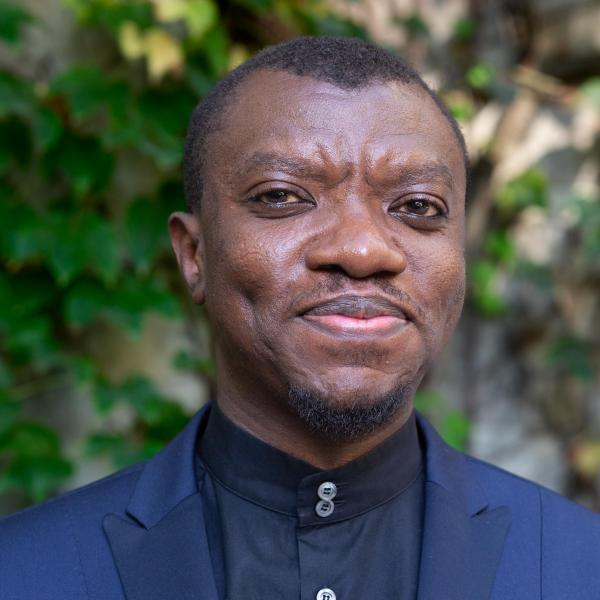
Kevin Irakoze received his PhD in Philosophy from the University of Chicago in 2024. He also earned graduate certificates in gender and sexuality studies, as well as college teaching. He works primarily in practical philosophy at the nexus of ethics and political philosophy. His general guiding question is on how to live well amid severely adverse political situations. His dissertation, “Transfigurative Imagination: Reclaiming Meaning and Agency in African Political Life,” clarified the ethical, existential, and political implications of the reality of political failure and argued for forms of imagination and agency that best fit the context, that is, a transfigurative imagination with an ability to open up new ways of seeing reality and a protest attitude that exceeds the limits of political inertia. On the foundation of this scholarship, one of his current research projects is on political virtues, offering a critique of a functional view in which individual character serves the ends of specific forms of government, and building an alternative view which asserts the priority of an individual ethical perspective on politics. Two other current research projects are in race and sexuality: a conception of hope in the writings of W. E. B. Du Bois and a meditation on antiqueer violence in Africa through the perspective of human personhood.
Recent Courses
PHIL 26208 Philosophy of Sex
What is good sex? Is sexual objectification harmful? Do we have a right to sex? What is sexual consent? This course invites students to engage with these questions and many others within the literature on the philosophy of sex. The centrality of sex and sexuality in human life makes it an apt, albeit complex object of philosophical inquiry. And, whereas many thinkers advance that our sexual lives hold a major influence on most other domains on our existence, we spend little time with intellectual inquiry about sex. In this course, we will engage with some classic texts alongside some of the most exciting recent writings in the philosophy of sex. We will explore such themes and topics as the erotic, sexual desire, perversion, consent, sexual orientation, pornography, prostitution, and sex equality. We will explore these themes through various perspectives, including metaphysics, ethics, and politics. Some of the authors we will read include Andrea Dworkin, Catharine MacKinnon, Michel Foucault, Sigmund Freud, Martha Nussbaum, Timo Airaksinen, Jean-Luc Marion, Raja Halwani, Amia Srinivasan and Manon Garcia among others. (A)
This course is discussion based and is open to undergraduate students of all levels.
PHIL 27543/37543 Black and/or Human: On Humanism and Racialized Being
What is it to be human and why does it matter? This course invites students to engage the question within the relation between theories of humanism and the histories of dehumanization as pertains to the racialization of Black people. Specific theories of the human have served as foundations of practices of dehumanization, and yet experiences of dehumanization have led to the development of new forms of humanism. In light of histories of enslavement and colonization and the related hierarchies of the human, what is the conceptual basis of the hierarchization within or exclusion from the category of the human? What does it feel like to be dehumanized and how does one adequately respond to such an experience? Some thinkers reject the concept while others reclaim it to inspire new existential outlooks on the world or political struggles. This course will explore the wide literature on these questions, supplementing written texts with other media such as film and music. We will focus on the implications of theories of humanism for the particularly human form of being, the pursuit of the good, and the organization of social life. Engagement in this course will be based on discussion, personal reflection, and the relation of course material to contemporary issues.
PHIL 27544 African Philosophy
This course is a general survey of African philosophy. We will read a selection of writings from African philosophers, spanning geographical space and historical periods. The tendency for the study of African philosophy is to focus solely on post-colonial writings with texts originally written in French or English. Against this tendency, the course will introduce students to a wider chronology of African philosophy that traverses various historical eras and with an attention to the diversity of the original languages of primary texts (including Ge’ez, Arabic, German, and Latin). In addition to often-studied figures such as Paulin Hountondji and Kwame Gyekye, we will engage with such thinkers as Ahmad Bābā al-Timbukti, Augustine of Hippo, Zara Yaqob, James Africanus Beale Horton, and Anton Wilhelm Amo. Instruction will emphasize the close reading of primary texts within relevant historical contexts. Students will be encouraged to engage African philosophy on its own terms and in conversation with other philosophical traditions. (A)
This course is introductory and does not require any prior coursework in philosophy.
PHIL 27543 Black and/or Human: On Humanism and Racialized Being
This course explores the relation between racialized being and humanity, with a focus on blackness. The histories of enslavement and colonization have been understood, fundamentally, as processes of dehumanization. The course seeks to address questions such as these: What is the conceptual basis of dehumanization, i.e. what (metaphysical, ethical, psychological, historical) conceptions of “human” act as the standards by which to measure the human deficiency of Black racialized peoples? What are the different meanings of the view that Blackness lacks being, when said by colonialists and when said an anti-racist intellectuals? What, in each case, is the exact argument? Is such an argument descriptive or also prescriptive? If the former, does it describe a mutable sociopolitical situation or a metaphysical truth? If the latter, what forms of conduct does the argument call for? What is an adequate response to dehumanization? Should one claim the status of the human, transform it, or reject it altogether? There are different answers to any of the questions in the literature. This course is a short survey of that literature.
Prior coursework on Critical Race Theory or consent of instructor.
